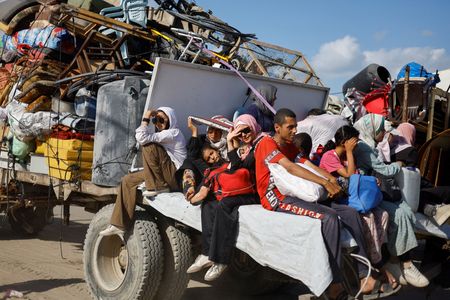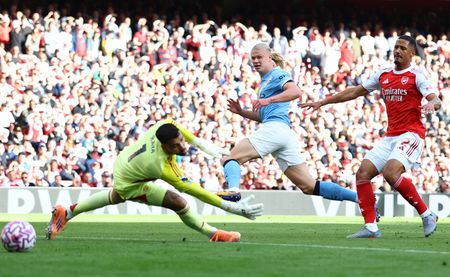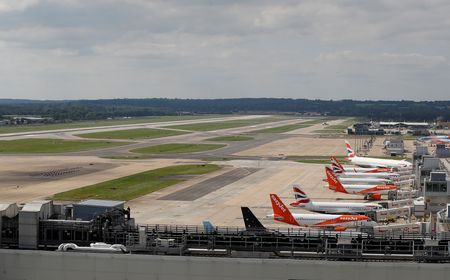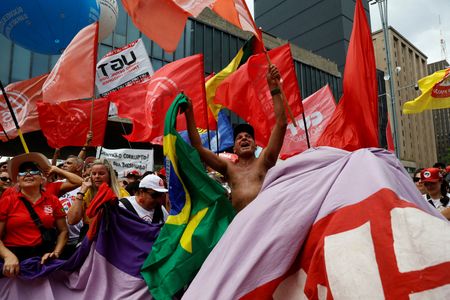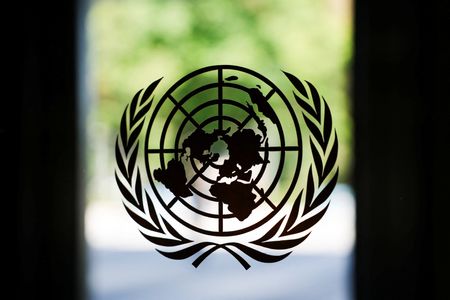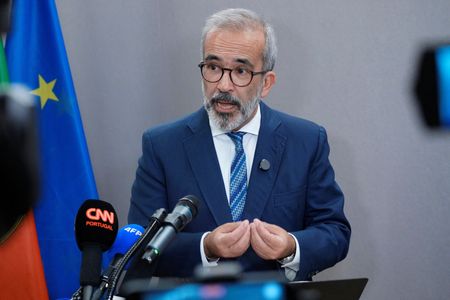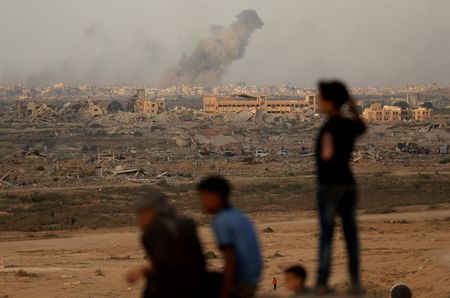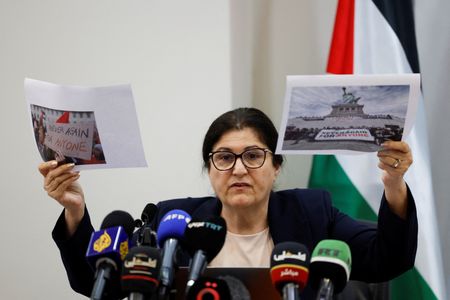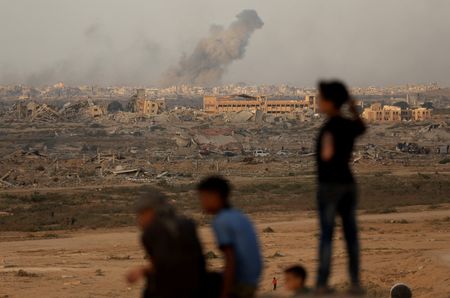By Catarina Demony and Bhargav Acharya
LONDON/TORONTO (Reuters) -Britain, Canada, Australia and Portugal all recognised a Palestinian state on Sunday in a move borne out of frustration over the Gaza war and intended to promote a two-state solution, prompting a furious response from Israel.
The decision by four nations from the West, which has traditionally allied with Israel, aligned them with more than 140 other countries also backing Palestinians’ aspiration to forge an independent homeland from the occupied territories.
Britain’s decision carried particular symbolism given its major role in Israel’s creation as a modern nation in the aftermath of World War Two.
“Today, to revive the hope of peace for the Palestinians and Israelis, and a two-state solution, the United Kingdom formally recognises the State of Palestine,” said Prime Minister Keir Starmer.
“The man-made humanitarian crisis in Gaza reaches new depths. The Israeli government’s relentless and increasing bombardment of Gaza, the offensive of recent weeks, the starvation and devastation are utterly intolerable.”
Other nations, including France, are expected to follow suit this week at the United Nations General Assembly in New York.
Israeli Prime Minister Benjamin Netanyahu condemned the move.
“I have a clear message to those leaders who recognise a Palestinian state after the horrific massacre of October 7: You are giving a huge reward to terrorism,” he said, referring to Palestinian militant group Hamas’ 2023 attack on Israel that triggered the nearly two-year war in Gaza.
“And I have another message for you: It will not happen. A Palestinian state will not be established west of the Jordan River.”
The Hamas-led attack on Israel killed 1,200 people and saw 251 others taken hostage, according to Israeli tallies.
Israel’s ensuing campaign in Gaza has killed more than 65,000 Palestinians, most of them civilians, according to local health authorities, spread famine, demolished most buildings and displaced most of the population – often multiple times.
PALESTINIANS WELCOME RECOGNITION
“It is a human duty of every respectful and free human being in the world to support Palestinians during the ordeal they are going through and Britain’s role now comes within this,” said Sharaf Al Tarda, a Palestinian resident of Hebron in the Israeli-occupied West Bank.
Hamas welcomed the move but said it must be accompanied by “practical measures” to end the war in Gaza and prevent Israel from annexing the West Bank.
Palestinian President Mahmoud Abbas said recognition would help pave the way for the “State of Palestine to live side by side with the State of Israel in security, peace, and good neighbourliness”.
Starmer wrote to Abbas to confirm Britain’s decision, noting that London had backed a Jewish homeland in 1917 while also pledging to protect the rights of non-Jewish communities.
Western governments have been under pressure from many in their parties and populations angry at the ever-rising death toll in Gaza, images of starving children and their states’ inability to rein in Israel, even continuing to provide arms.
Londoners voiced mixed reactions on Sunday.
“A whole lot needs to happen and peace needs to come to that region,” said 56-year-old charity director Michael Angus. “This is the first step in actually acknowledging that those people have a right to have somewhere to call home.”
Announcing his country’s decision, Canadian Prime Minister Mark Carney said it would empower those seeking peaceful co-existence and the end of Hamas. “This in no way legitimises terrorism, nor is it any reward for it,” he added.
Portugal’s Foreign Affairs Minister Paulo Rangel said this recognition was a “fundamental line of Portuguese foreign policy”. Speaking to reporters at the headquarters of Portugal’s permanent mission to the United Nations in New York, he said: “Portugal advocates the two-state solution as the only path to a just and lasting peace…a ceasefire is urgent.”
The United States, Israel’s closest ally, did not comment immediately on the decision by three of its allies to recognise a Palestinian state, but President Donald Trump has previously made clear he opposes such a move.
Israeli Security Minister Itamar Ben-Gvir said he would propose that the cabinet apply sovereignty in another Israeli-occupied Palestinian territory, the West Bank. That would represent de facto annexation of land seized in a 1967 war.
BRITAIN PLAYED A KEY HISTORIC ROLE
British troops captured Jerusalem from the Ottoman Empire in 1917, and in 1922 the League of Nations awarded Britain an international mandate to administer Palestine during the post-war deal-making that redrew the map of the Middle East.
Mandy Damari, the British mother of released British-Israeli hostage Emily Damari, told Reuters on Sunday that Starmer was “under a two-state delusion” given that the Gaza Strip’s government was still Hamas whose mission was to destroy Israel.
“He is rewarding Hamas for the 7th October barbaric and savage attack on Israel when the hostages are still not back, the war is not over and Hamas are still in power in Gaza.”
Husam Zomlot, head of the Palestinian Mission to the UK, watched on his phone as Starmer announced Britain’s recognition of a Palestinian state.
At the London headquarters of the mission, which may now be upgraded to an embassy, there were smiles and embraces.
“Today is a moment when the UK Prime Minister and the British government, on behalf of their people, stand and say: ‘We must correct history, we must right the wrongs’,” Zomlot said.
(Reporting by Catarina Demony, Andrew MacAskill, Hannah Confino, Alistair Smout, Marissa Davison and Vitalli Yalahuzia, Bhargav Acharaya, May Angel, Michelle Nichols and Alexander Cornwell, Writing by Andrew Cawthorne and Gareth Jones,Editing by Ros Russell and Chizu Nomiyama )

